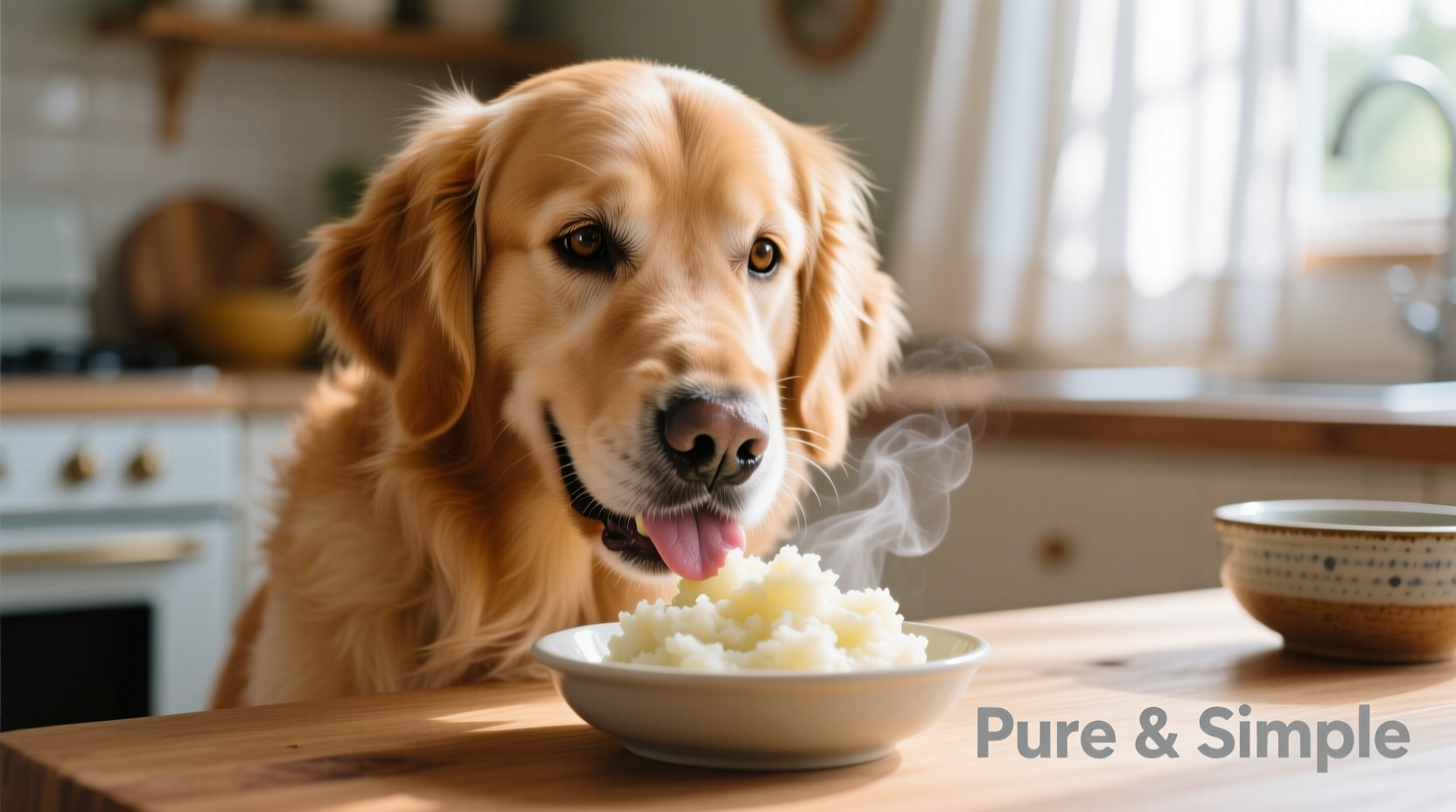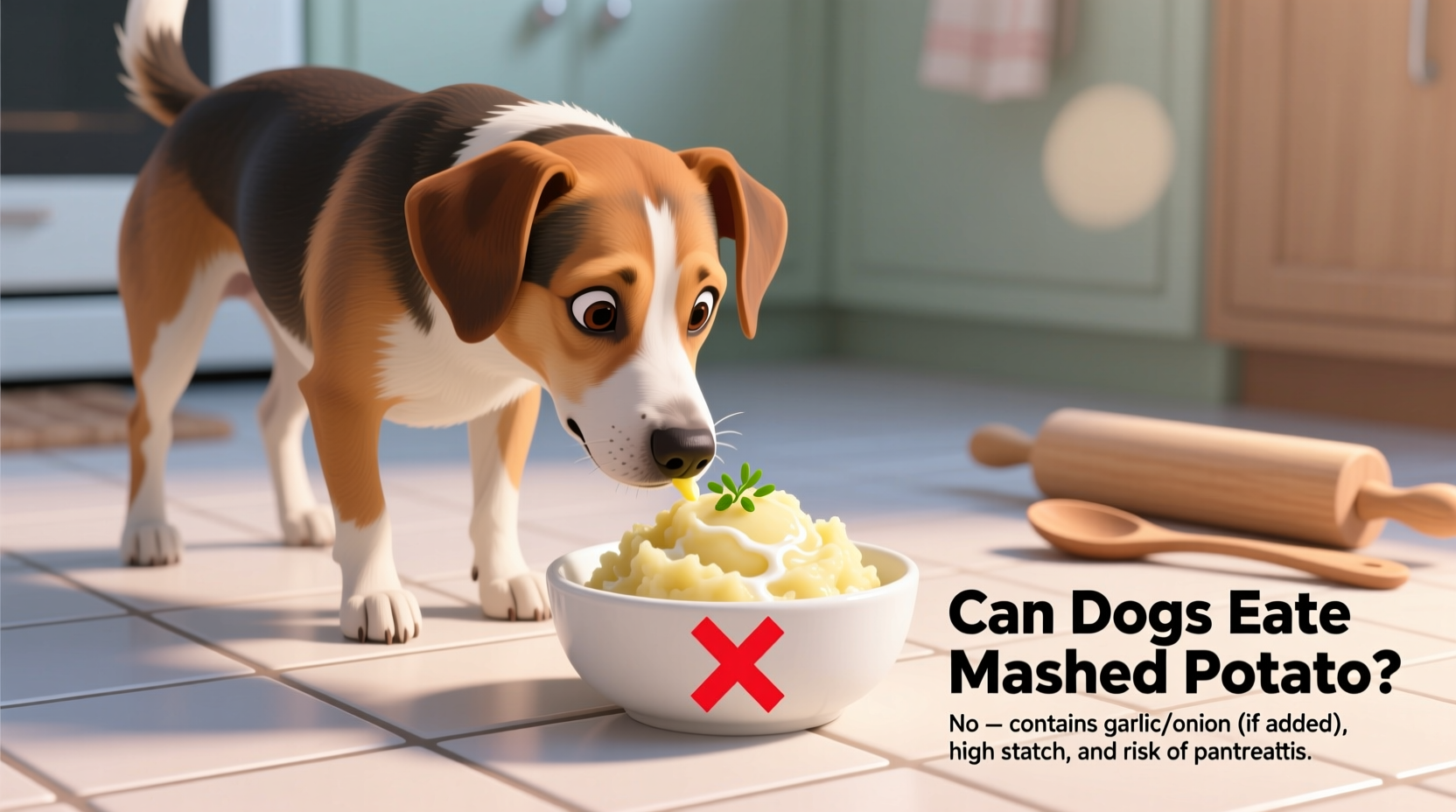As a dog owner, you've probably wondered whether that spoonful of mashed potatoes from your plate is safe to share with your furry companion. You're not alone—thousands of pet parents search this question daily, worried they might accidentally harm their dog with a seemingly harmless human food. In this guide, you'll get clear, veterinarian-backed answers about when mashed potatoes are safe for dogs, which ingredients make them dangerous, and exactly how much is appropriate to feed your canine friend.
Understanding Potato Safety for Dogs
While potatoes might seem like a simple side dish to us, they present specific considerations for canine consumption. The key factor determining safety isn't the potato itself, but how it's prepared and what's added to it. According to the American Kennel Club's Canine Nutrition Center, plain cooked potatoes provide carbohydrates and some vitamins that won't harm most dogs when given sparingly.
| Preparation Method | Safe for Dogs? | Key Considerations |
|---|---|---|
| Plain boiled potatoes, mashed | Yes (in moderation) | No additives, cooled before serving |
| Potatoes with butter/milk | No | Dairy can cause digestive upset in many dogs |
| Potatoes with garlic/onions | Dangerous | These cause hemolytic anemia in dogs |
| Raw potatoes | Unsafe | Contain solanine toxin, difficult to digest |
Why Plain Mashed Potatoes Can Be Safe (With Conditions)
When prepared correctly, mashed potatoes offer some nutritional benefits for dogs. Cooked potatoes contain vitamin C, vitamin B6, and potassium—nutrients that support your dog's immune system and nerve function. However, these benefits come with important caveats:
- Cooking is essential—Raw potatoes contain solanine, a naturally occurring toxin that can cause gastrointestinal distress, weakness, and even neurological problems in dogs. The solanine concentration decreases significantly when potatoes are thoroughly cooked.
- Portion control matters—The Association of American Feed Control Officials (AAFCO) recommends that treats shouldn't exceed 10% of your dog's daily caloric intake. For a medium-sized dog, this means no more than 1-2 tablespoons of plain mashed potatoes occasionally.
- Individual sensitivities vary—Some dogs have difficulty digesting starches. When introducing potatoes for the first time, start with a teaspoon-sized portion and monitor for 24 hours for any signs of digestive upset.

Dangerous Ingredients in Mashed Potatoes You Must Avoid
The real danger with mashed potatoes for dogs comes from common human preparation methods. Many traditional mashed potato recipes include ingredients that are toxic or problematic for canines:
Garlic and Onions: The Silent Threat
These allium family members contain thiosulfate compounds that damage red blood cells in dogs, leading to hemolytic anemia. According to research published in the Journal of Veterinary Pharmacology and Therapeutics, even small amounts (as little as 5g per kg of body weight) can cause toxicity. Symptoms may not appear for several days, making early detection difficult.
Dairy Products: A Digestive Nightmare
While some dogs tolerate small amounts of dairy, many are lactose intolerant. The ASPCA reports that approximately 60% of adult dogs lack sufficient lactase enzyme to properly digest milk products. When dairy is added to mashed potatoes, it can cause vomiting, diarrhea, and abdominal discomfort.
When Mashed Potatoes Might Actually Help Your Dog
Surprisingly, plain mashed potatoes can serve a therapeutic purpose in specific situations. Board-certified veterinary nutritionists sometimes recommend a temporary bland diet of boiled chicken and plain mashed potatoes for dogs experiencing mild gastrointestinal upset. The starch helps firm up stools while being gentle on the digestive system.
However, this should only be done under veterinary guidance and for short durations (typically 24-48 hours). Prolonged use of this diet lacks essential nutrients dogs require. The University of California Davis School of Veterinary Medicine cautions that while potatoes can help during digestive recovery, they shouldn't replace balanced commercial dog food for more than two days.
What to Do If Your Dog Ate Unsafe Mashed Potatoes
If your dog consumed mashed potatoes containing toxic ingredients like garlic or onions, immediate action is crucial. Contact your veterinarian or the ASPCA Animal Poison Control Center (888-426-4435) right away. Provide details about what your dog ate, how much, and when.
Watch for these warning signs that require emergency veterinary care:
- Vomiting or diarrhea lasting more than 12 hours
- Weakness or lethargy
- Pale gums (indicates anemia)
- Increased heart rate
- Difficulty breathing
Healthier Alternatives to Traditional Mashed Potatoes
If you want to share a potato-based treat with your dog, consider these safer preparation methods:
- Dog-Safe Mashed Potato Recipe: Boil one small potato until fork-tender, mash with a fork (no liquid), and let cool completely. For added nutrition, mix in 1 teaspoon of plain pumpkin puree.
- Sweet Potato Alternative: Many veterinarians actually recommend sweet potatoes over white potatoes for dogs. They contain more fiber and beta-carotene. Bake or boil without seasoning, then mash.
- Vegetable Medley: Steam and mash carrots, green beans, and zucchini together for a nutrient-dense side that's safer than traditional mashed potatoes.
Remember that any human food given to dogs should be considered an occasional treat, not a regular part of their diet. Your dog's primary nutrition should come from a complete and balanced commercial dog food appropriate for their life stage and health condition.











 浙公网安备
33010002000092号
浙公网安备
33010002000092号 浙B2-20120091-4
浙B2-20120091-4